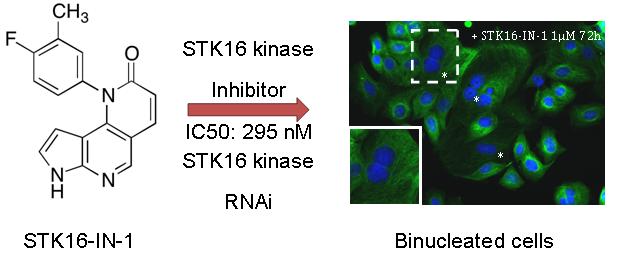Aug 23,2016|By
A collaborative research team in
Discovered almost two decades ago, STK16, a protein kinase, is ubiquitously expressed and is conserved among all eukaryotes. However, even till now its detailed biological function is still poorly understood.
Through screening of an in-house developed focused kinase inhibitors library, the team discovered a highly selective ATP competitive inhibitor, STK16-IN-1, which exhibits potent inhibitory activity against STK16 kinase (IC50: 0.295 M) with excellent selective across the kinome.
In MCF-7 breast cancer cells, treatment with STK16-IN-1 results in a reduction in cell number and accumulation of binucleated cells, which can be recapitulated by RNAi knockdown of STK16. Co-treatment of STK16-IN-1 with chemotherapeutics such as cisplatin and doxorubicin leads to a slight potentiation of the anti-proliferative effects of the chemotherapeutics. The dicovery of STK16-IN-1 provides a useful pharmacological probe to further reveal the biological functions of STK16.
This work was conducted by Professor LIU Qingsong, LIU Jing and ZHANG Xin’s groups in CHMFL and Professor Nathaneal Gray’s group in HMS. Related results were published in
The research was supported by China “Thousand Talent Program”, "Hundred Talent Program” of the CAS, and the grant of "Cross-disciplinary Collaborative Teams Program for Science, Technology and Innovation (2014-2016)" et al.
 |
|
STK16-IN-1 gave rise to accumulation of binucleated MCF-7 cells, which can be recapitulated by RNAi knockdown of STK16. |
Attachments Download: